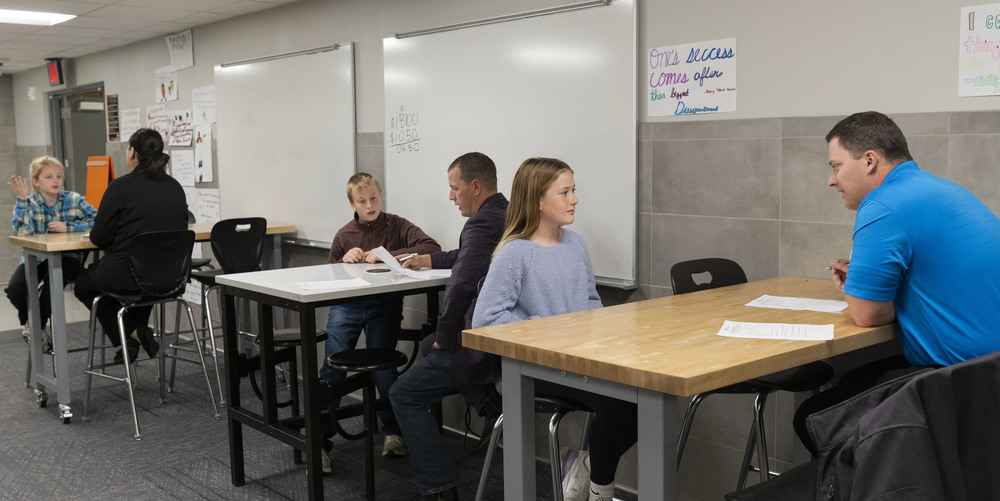The irony for first-time job applicants is the "experience paradox": you need a job to get experience, but you need experience to get a job.
So, when Cleveland sixth graders were applying for jobs at Junior Achievement’s day-long simulated community “BizTown,” drafting resumes and preparing for interviews, they had to think long and hard about what experience they did have and the skills they gained along the way.
“I wanted to show I am hard working,” said Kennedy Dauk, “so during the interview, I talked about being on the (elementary) Student Council and how I had to make plans for using its money.”
In a dozen daily lessons leading up to the interviews, which were held in the shared space outside their classrooms on October 28, the sixth graders studied the monetary system: business, banking and economic concepts. Then they learned about what skills are important for a job. After that, they worked with their teachers Brady Hahn and Bree Meyer to prepare their resumes.
Besides being on the student council, babysitting, mowing lawns, helping their dad with construction projects, volunteering for school lunchroom cleanup and being a member of the School Patrol were examples of their working experience.
Seven adult volunteers conducted interviews with the more-than-50 sixth graders. Most of the students were nervous about their first-ever interview, but they knew beforehand the questions that would be asked.
Interviewers rated the students’ resumes for completion and neatness. They evaluated their professionalism: how well they communicated, made eye contact and articulated why they wanted their first-choice job and their qualifications for it. Students had to provide examples of their creativity, leadership, dependability and how they functioned within a team.
In her position in the state of Minnesota’s health care system, Becky Kern, one of the BizTown interviewers, conducts lots of interviews, so she knows what makes for a candidate that will go on in the hiring process versus one that will be left behind.
“They have to be present and engaged, and that first impression is important. Employers are looking for people not necessarily having every skill set that you need them to have because you can teach them that, but what’s their presence like? What’s their body language? Do they engage with you? Do they seem distracted or not?”
Kern also said being sincere was important.
“The last one who interviewed with me didn’t necessarily present a lot of skills, but he was very honest about it and would tell me why, which was something I would rank higher. If you don’t have that skill, you’re not making something up—and you can tell when someone is making something up—that’s a plus.”
Overall, the sixth graders interviewed well, she said.
“The majority were very thoughtful. They thought about their answer before they said it, which you don’t always see. Many applicants just want to spit out an answer. I was so impressed with one of the girls because of her body language: her posture. She was not distracted even though there were a lot of kids walking through. She kept her focus on me. A few of them did a good job of having their answers built towards why their first-choice job would be good job for them, which was great.”
Students listed the top three jobs they wanted, which they picked from 18 different institutions, including government, media, finance, manufacturing, retail and healthcare. Dauk, for example, because she enjoys preparing food, wanted to work as a food manager at the town’s café. She didn’t get that job, which was much in demand, but she will still work at the café as a sales manager.
The sixth graders will make the trip to JA’s BizTown, a 12,000-square-foot facility in St. Paul, on December 10. They will receive a ‘paycheck’ for their work and get to spend it and save it throughout their day.
Along with Kern, interviewing the sixth graders were Matt Thompson and Candace Lyons of Mayo Health Care, Troy Olson of Latitude 44 Plumbing & Heating, Scott Rutz of Microsoft, Mary Berg of the Department of Education and senior CHS student Elijah Mons.
BizTown goals and results
As a part of JA BizTown, students learn about the roles they play as citizens and workers. They learn the importance of citizen rights and responsibilities in a community. They get a basic understanding of the free enterprise system and basic business practices and responsibilities and build money management skills by learning about economic concepts and banking practices. They also learn the soft skills necessary for successful participation in the world of work.
Through daily lessons, experiential activities, and participation in this simulated economy, students develop a strong understanding of the relationship between what they learn in school and how it can be applied in the real world, said JA Director – Minnesota Operations Katie Mons, who was on hand for the interviews.
“By ‘working’ in one of JA BizTown’s learning lab shops, students, paired with volunteers, learn what it takes to run a successful business, manage a debit card and checking account, and work as a team.”
Students completing the JA BizTown program have greater confidence in how to earn, spend, and save money and are more likely to use their earnings to help others, Mons said. They gain a stronger understanding of the role businesses play in the community and become more aware of the career options in their community and the skills needed to be successful in their future job.
About JA
Junior Achievement is a nonprofit that inspires and prepares young people for success. JA North division serves Minnesota, North Dakota, and western Wisconsin. Its programs align to three pathways: Financial Literacy, Career Readiness, and Entrepreneurship. K-12 curriculum is hands-on and meets Minnesota and National Standards.
In the Greater Mankato Area, JA North is expected to impact over 10,000 students this school year. Its programs extend through 46 schools, including Cleveland, Mankato, North Mankato, Eagle Lake, Lake Crystal, Maple River, St. Clair, St. Peter, JWP, TCU and Nicollet.
JA relies on volunteers, donations, grants and fundraisers to bring JA curriculum into classrooms at no cost to the school. Donors include the Davis Family Foundation, which supports Cleveland’s JA programming.
To learn more about Junior Achievement, visit www.janorth.org. To volunteer or make a tax-deductible donation to JA, please email Katie Mons at katie.mons@janorth.org.
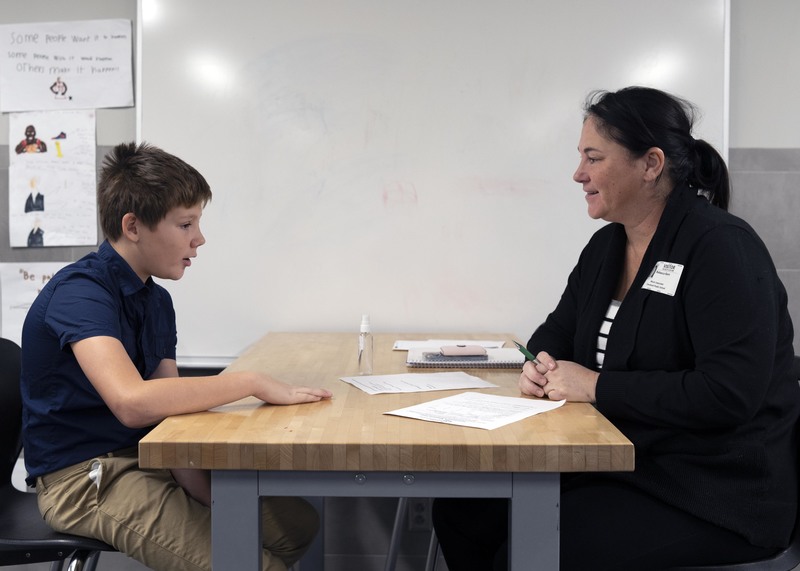 Becky Kern conducts an interview.
Becky Kern conducts an interview.
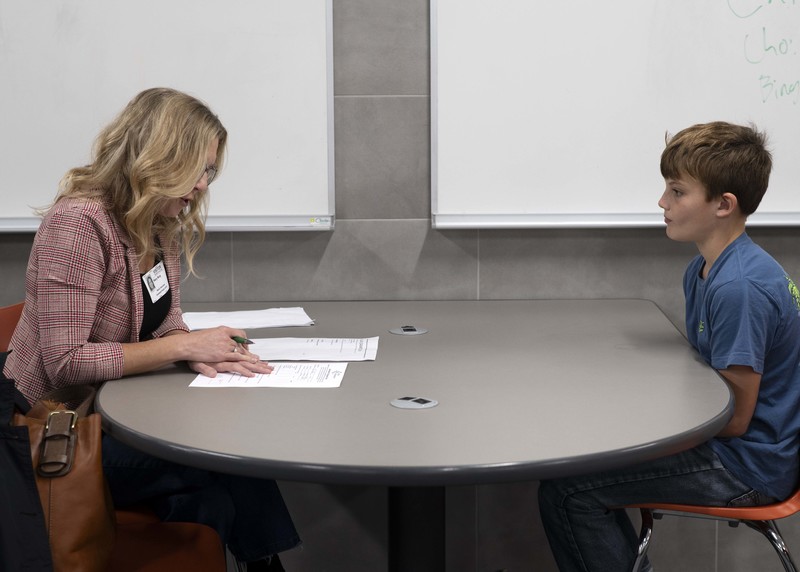 Mary Berg interviews a student.
Mary Berg interviews a student.
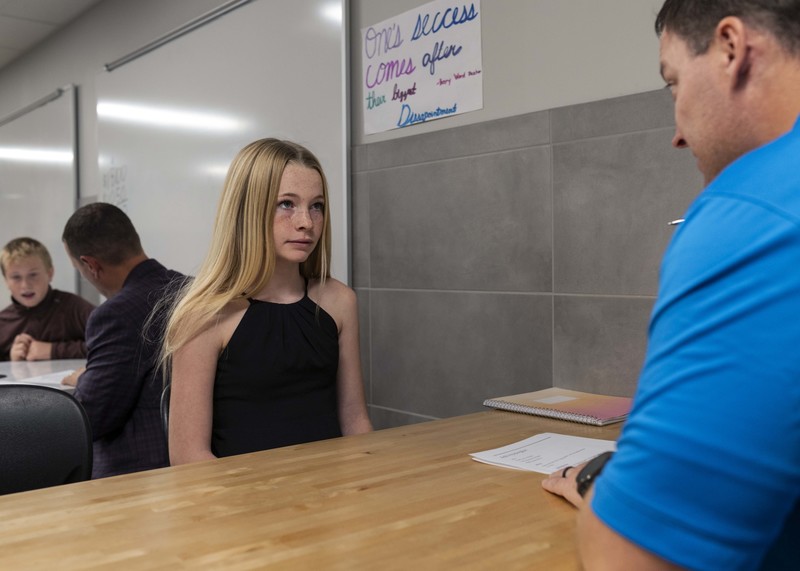 Matt Thompson conducts an interview.
Matt Thompson conducts an interview.
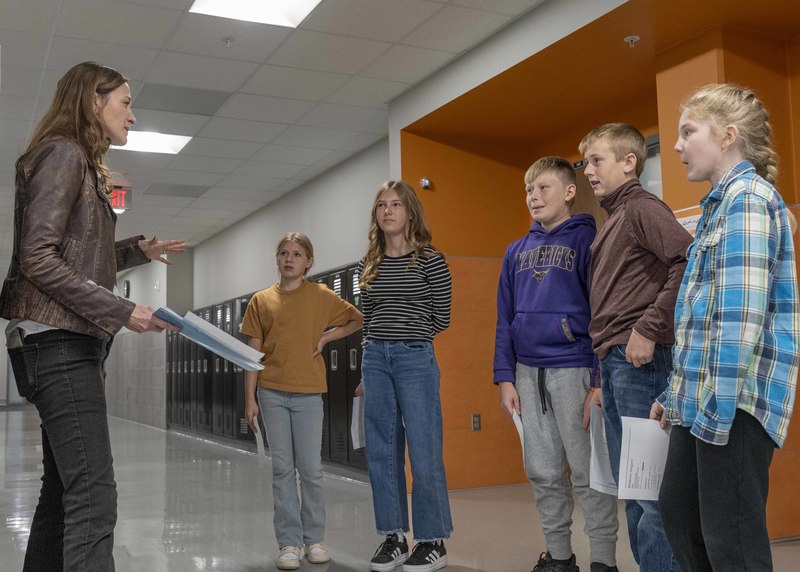 Katie Mons advises a group of sixth graders as they await their interviews.
Katie Mons advises a group of sixth graders as they await their interviews.
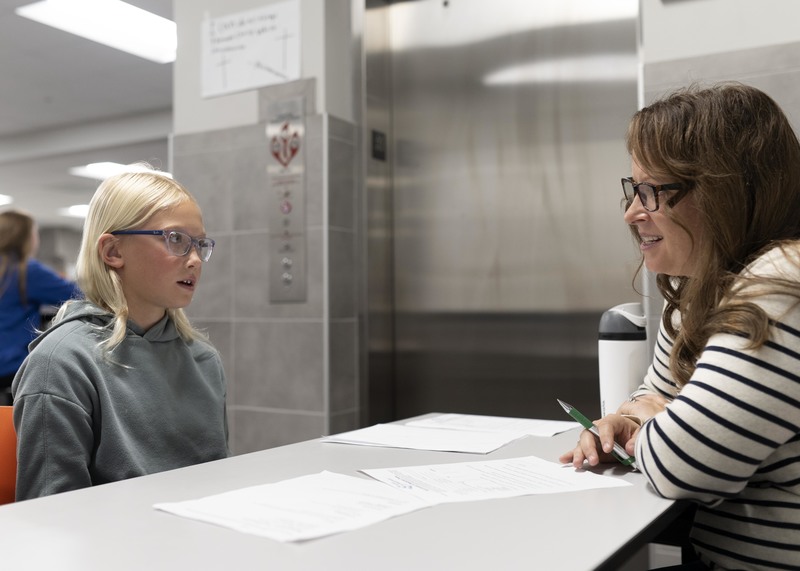 Candace Lyons interviews a student.
Candace Lyons interviews a student.
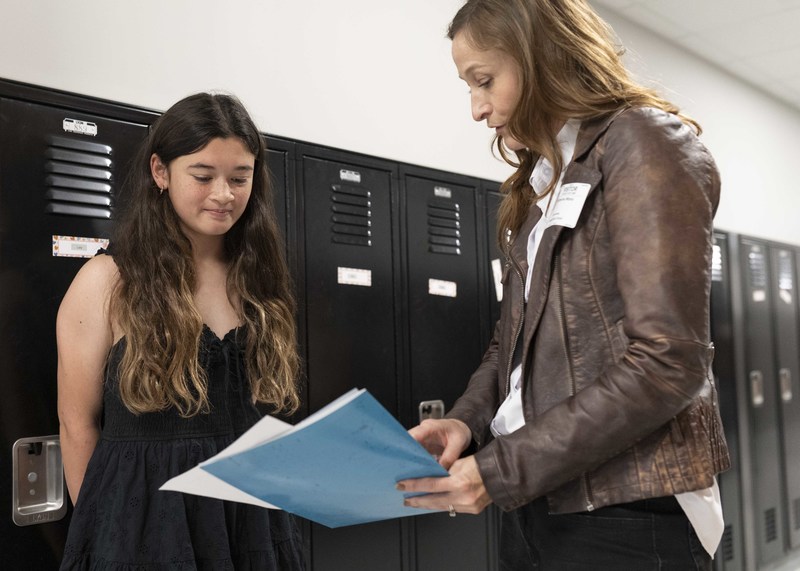 Katie Mons helps a student prepare just before her interview.
Katie Mons helps a student prepare just before her interview.
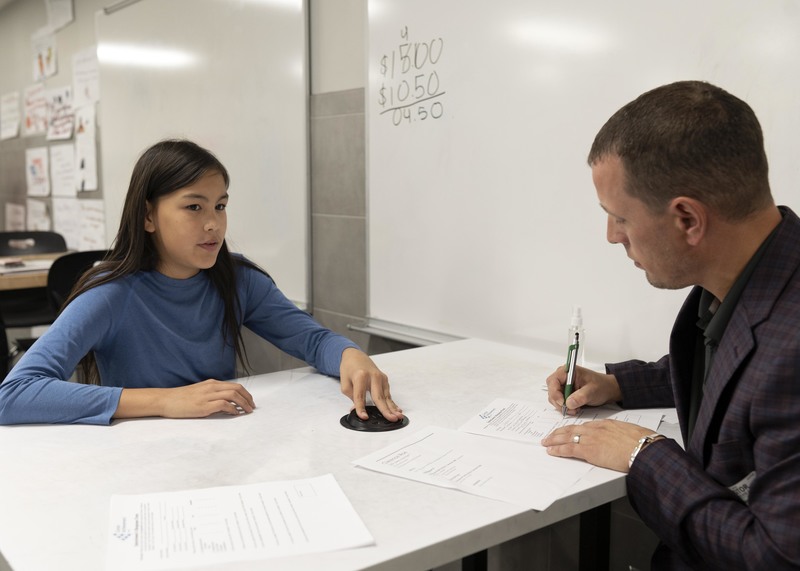 Troy Olson conducts an interview.
Troy Olson conducts an interview.
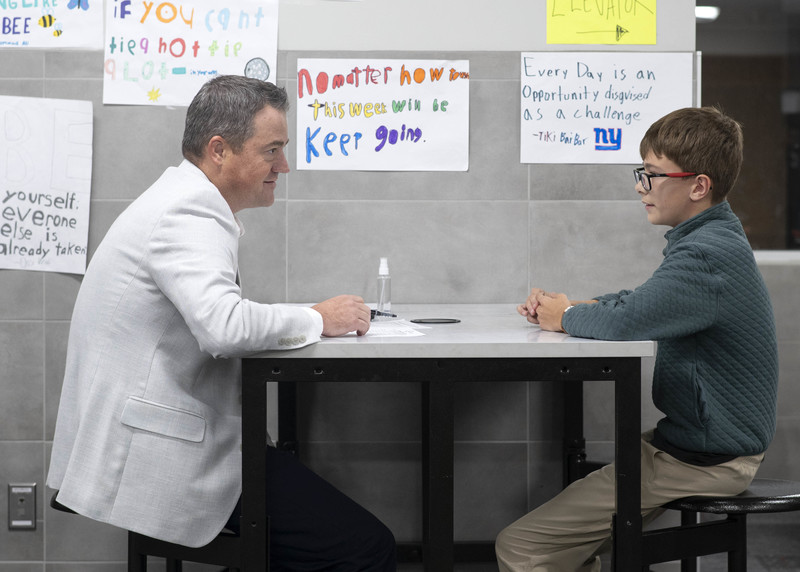 Scott Rutz interviews a student.
Scott Rutz interviews a student.
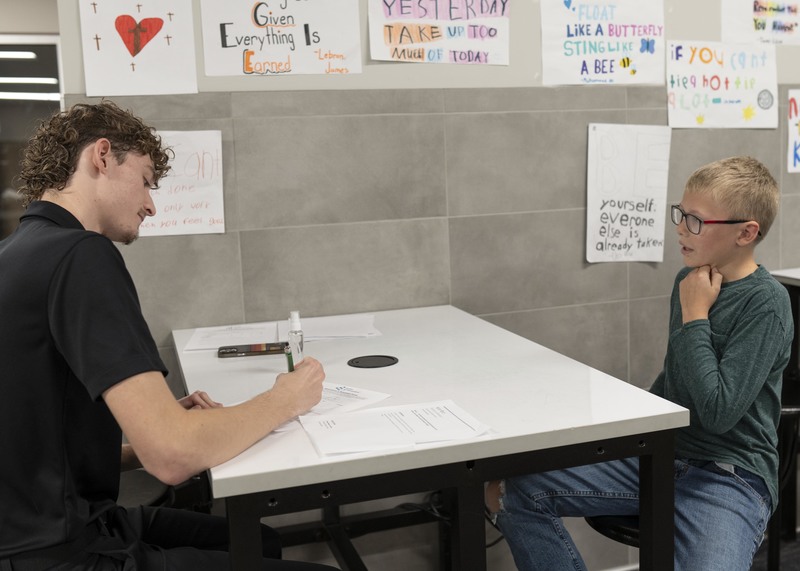 CHS student Elijah Mons stepped in to conduct interviews, and it was an educational experience for him as well, he said. “I’m learning to be more consistent in asking people questions and just letting them represent themselves instead of leading them into saying things I want to hear.”
CHS student Elijah Mons stepped in to conduct interviews, and it was an educational experience for him as well, he said. “I’m learning to be more consistent in asking people questions and just letting them represent themselves instead of leading them into saying things I want to hear.”
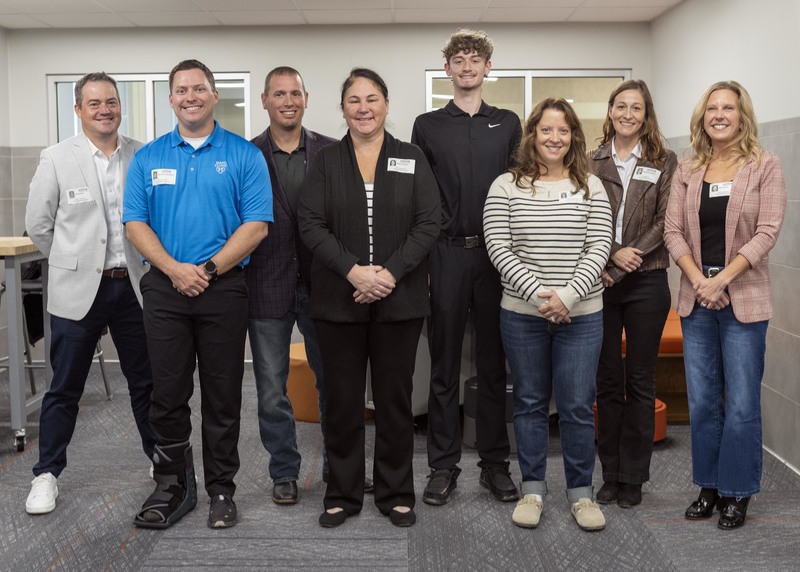 Katie Mons (second from right) and the volunteer interviewers, from L-R Scott Rutz of Microsoft, Matt Thompson of Mayo Health Systems, Troy Olson of Latitude 44 Plumbing & Heating, Becky Kern of Minnesota’s State-Operated Behavioral Health Care System, CHS senior Elijah Mons, Candace Lyons of Mayo Health Systems and Mary Berg of the Department of Education
Katie Mons (second from right) and the volunteer interviewers, from L-R Scott Rutz of Microsoft, Matt Thompson of Mayo Health Systems, Troy Olson of Latitude 44 Plumbing & Heating, Becky Kern of Minnesota’s State-Operated Behavioral Health Care System, CHS senior Elijah Mons, Candace Lyons of Mayo Health Systems and Mary Berg of the Department of Education
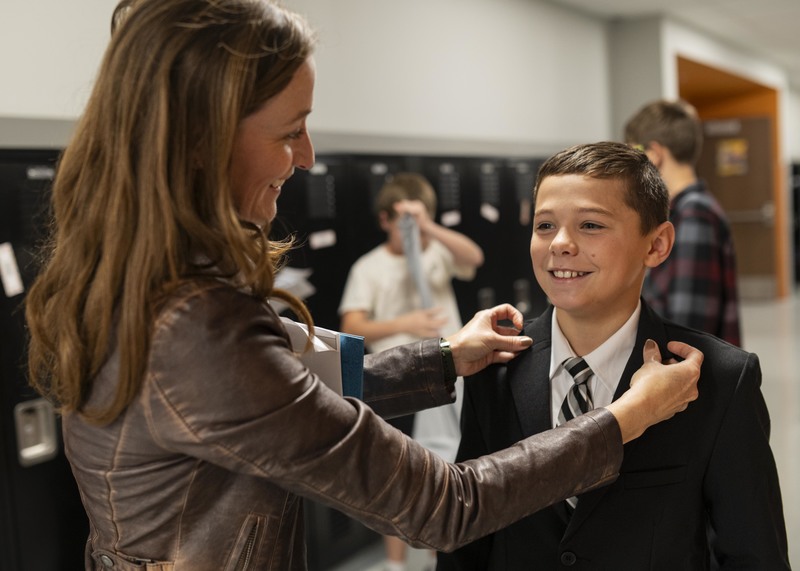 Many students dressed up for their interviews. Here, Katie Mons helps a student adjust his suitcoat.
Many students dressed up for their interviews. Here, Katie Mons helps a student adjust his suitcoat.
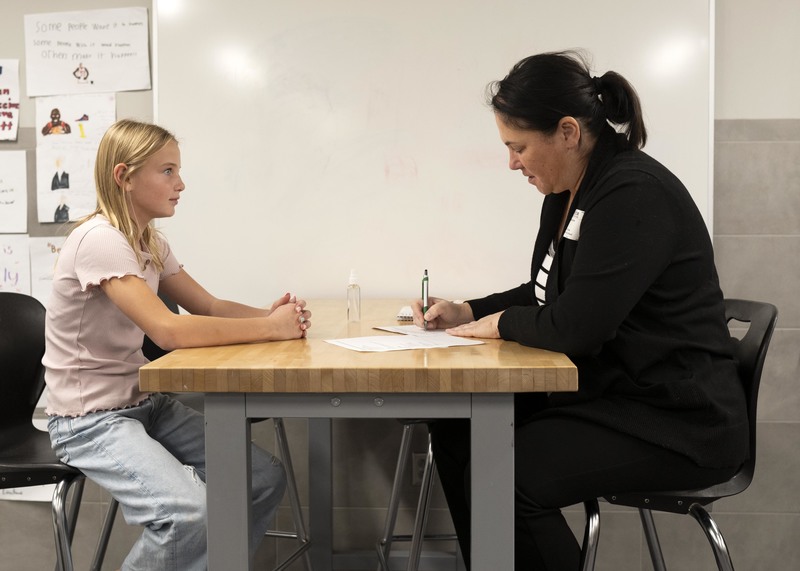 Becky Kern conducts an interview.
Becky Kern conducts an interview.
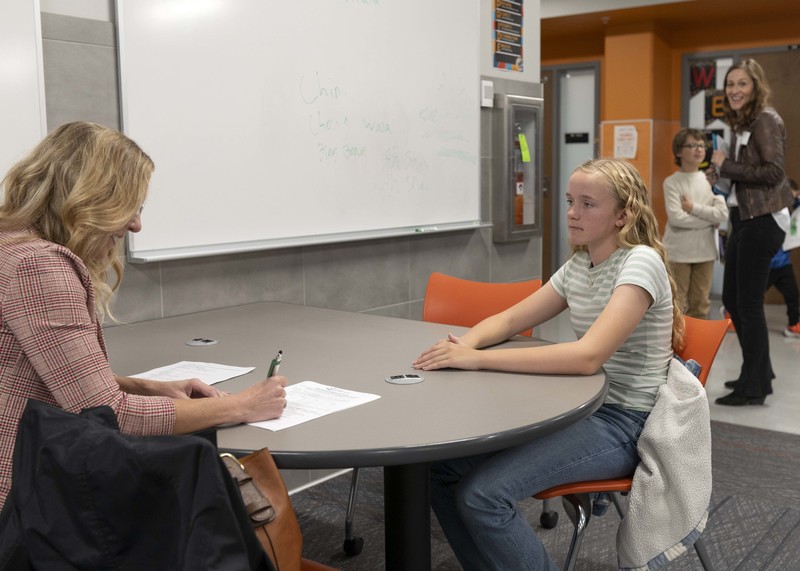 Mary Berg conducts an interview.
Mary Berg conducts an interview.
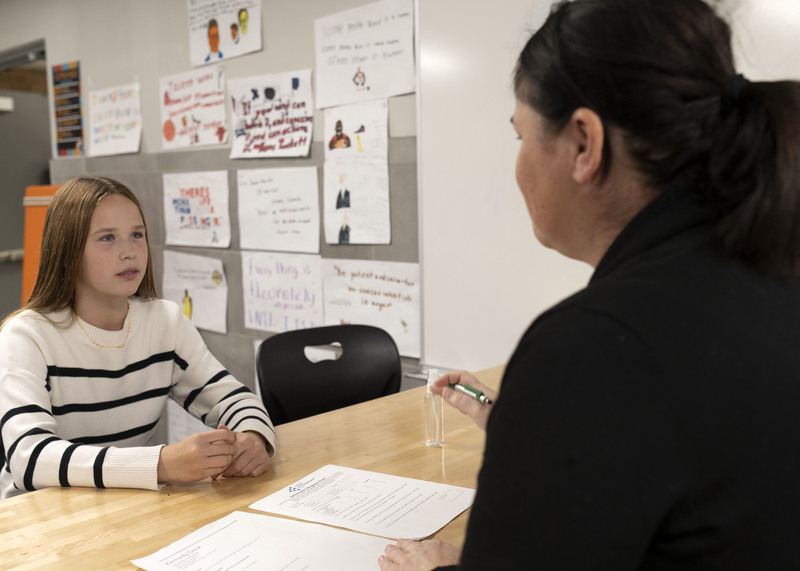 Becky Kern conducts an interview.
Becky Kern conducts an interview.
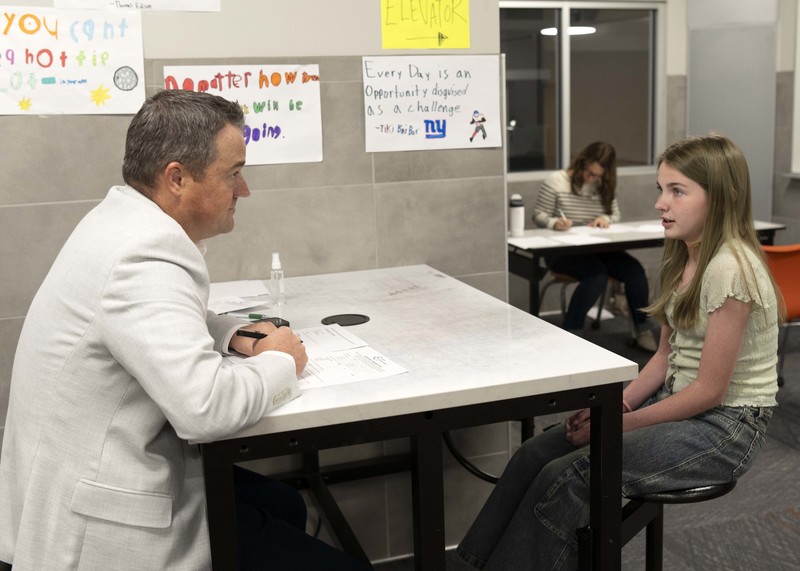 Scott Rutz interviews a student.
Scott Rutz interviews a student.
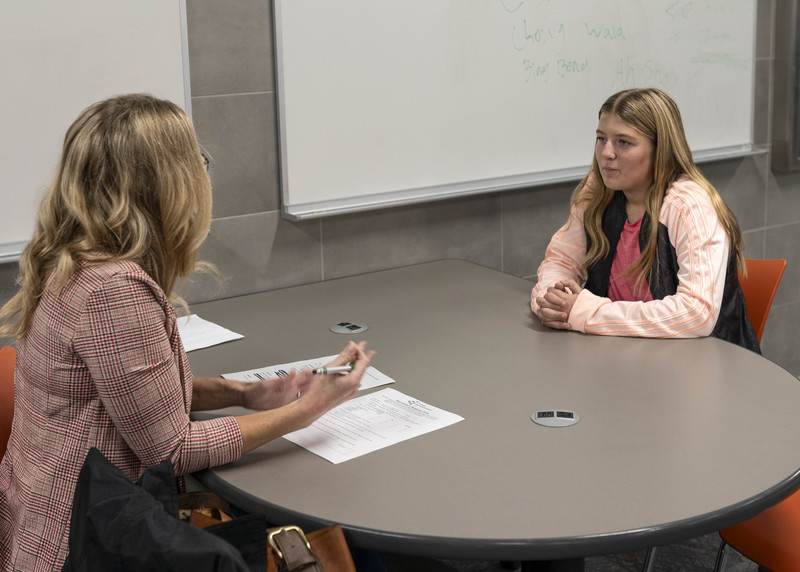 Mary Berg interviews a student.
Mary Berg interviews a student.
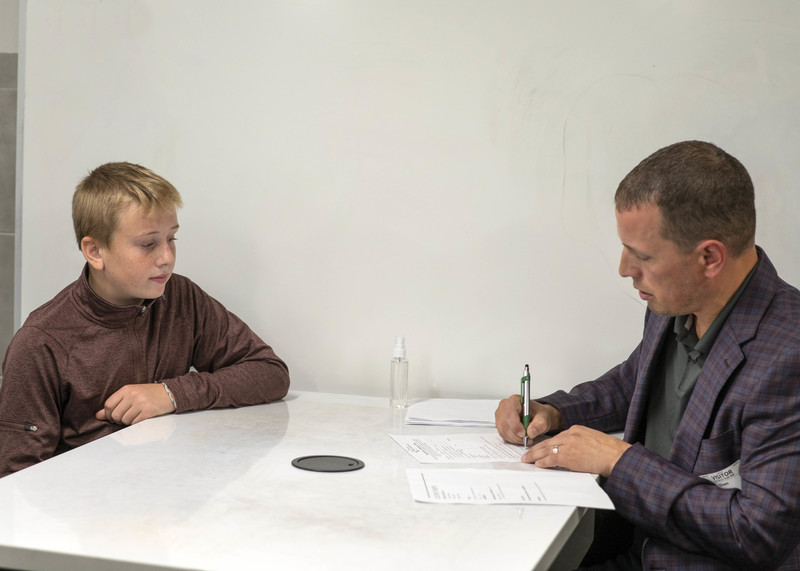 Troy Olson conducts an interview.
Troy Olson conducts an interview.
 Elijah Mons interviews a student.
Elijah Mons interviews a student.
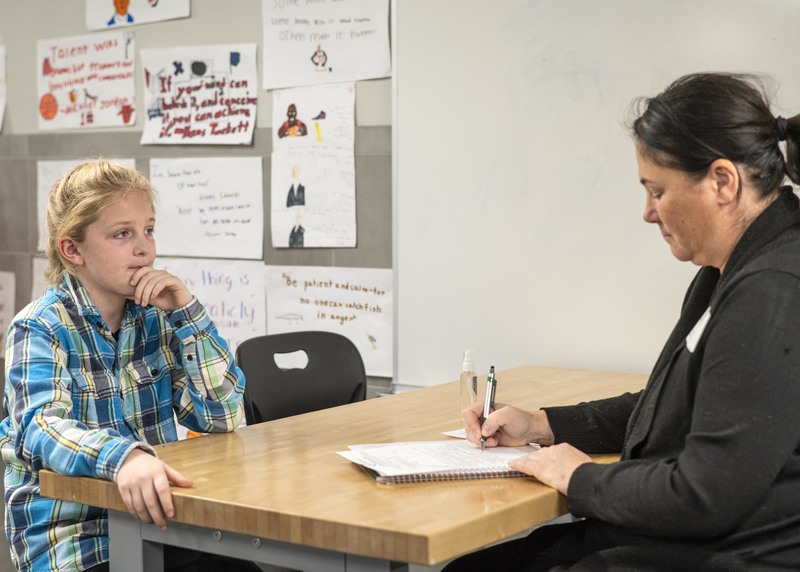 Becky Kern conducts an interview.
Becky Kern conducts an interview.
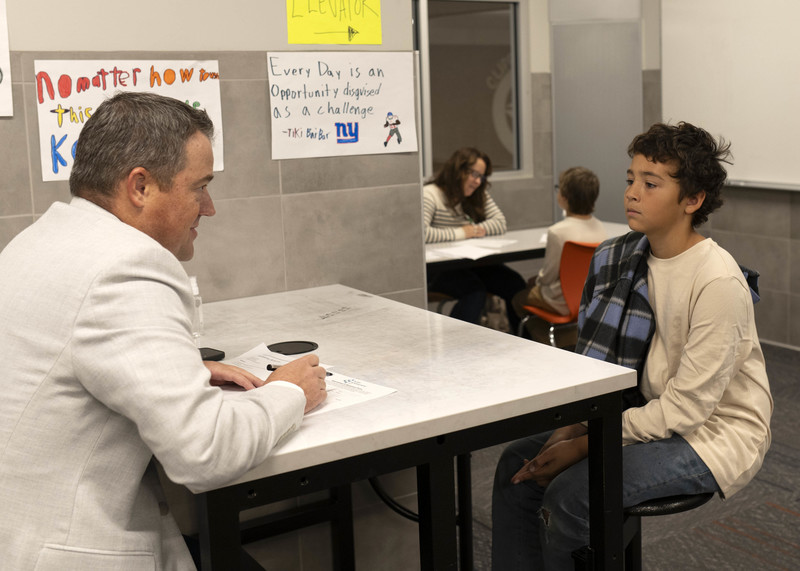 Scott Rutz interviews a student.
Scott Rutz interviews a student.
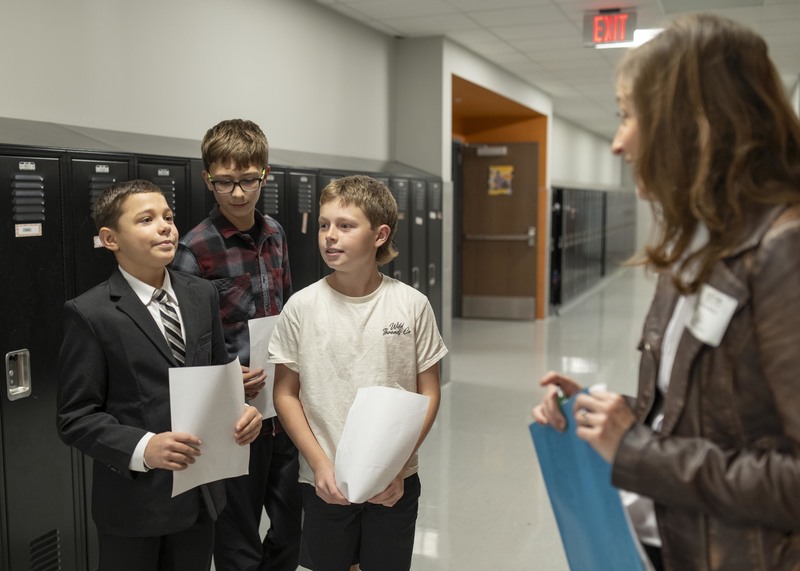 Students wait for their interviews.
Students wait for their interviews.
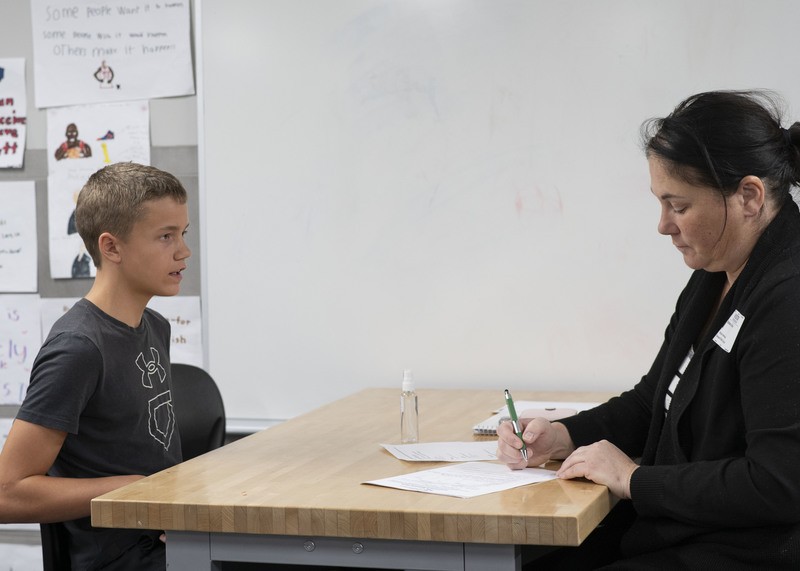 Becky Kern conducts an interview.
Becky Kern conducts an interview.
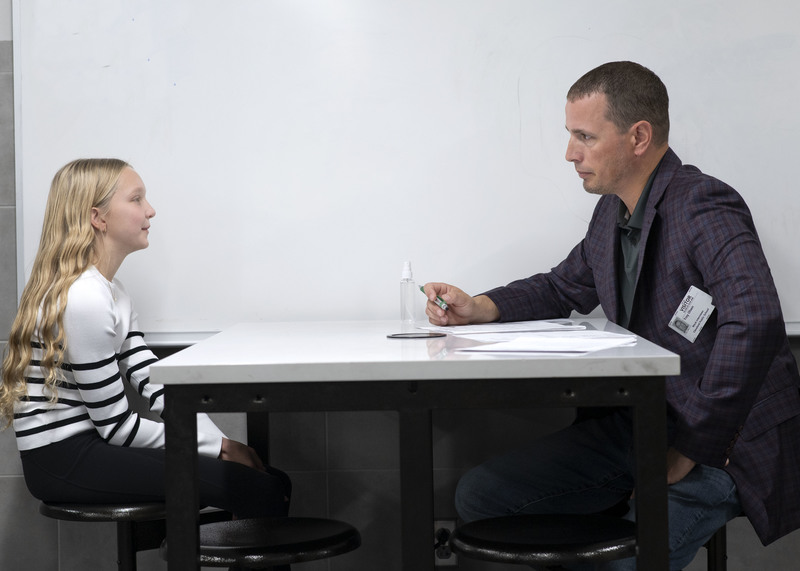 Troy Olson conducts an interview.
Troy Olson conducts an interview.
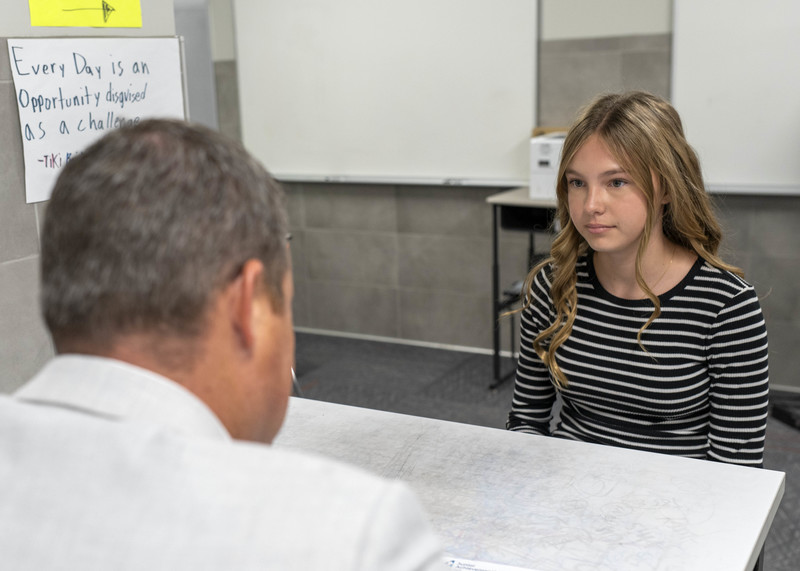 Scott Rutz interviews a student.
Scott Rutz interviews a student.
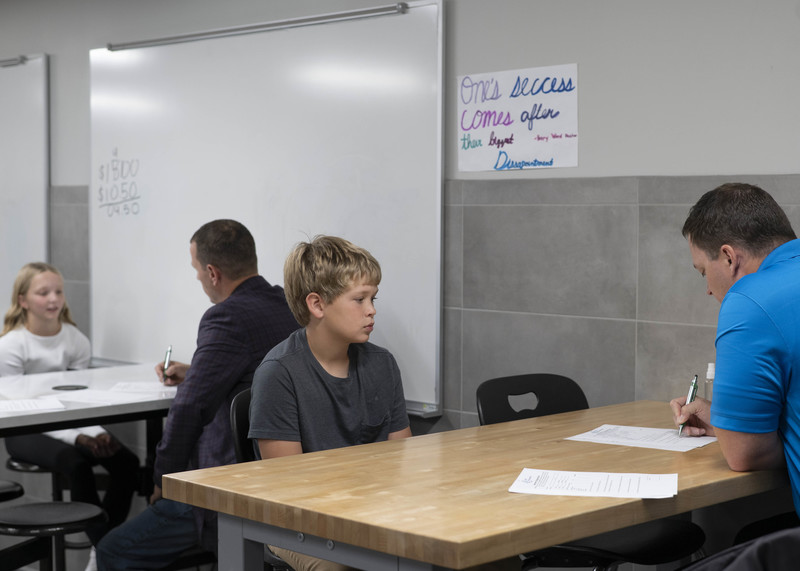 Matt Thompson conducts an interview.
Matt Thompson conducts an interview.

